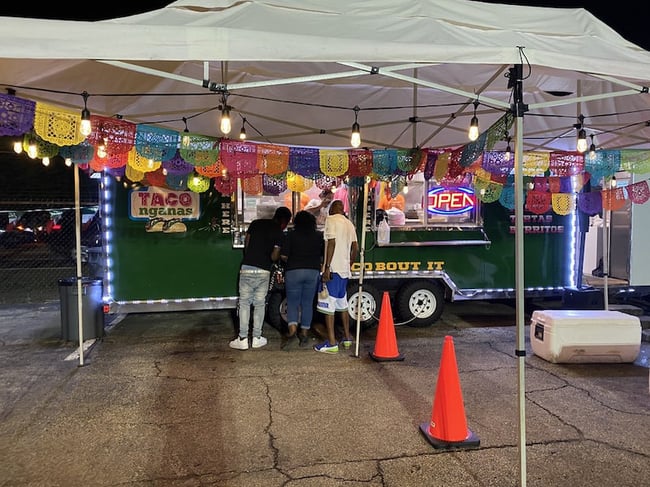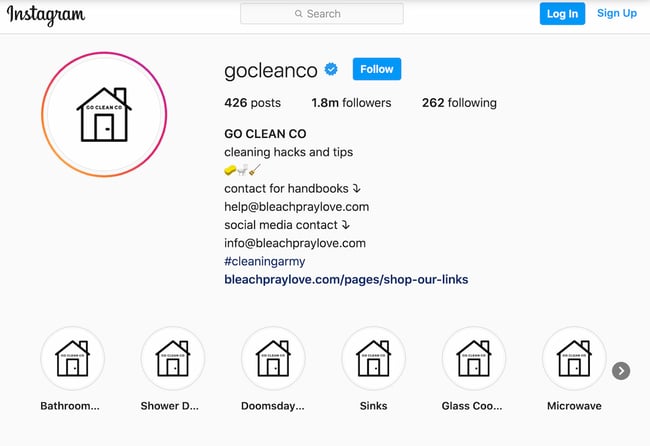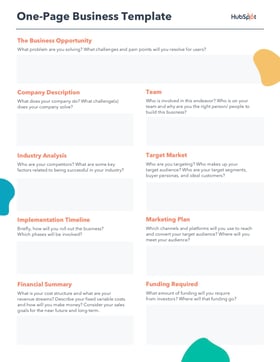Small Stores That Are Easy to Start
A good business idea may seem hard to come by, but with some planning and preparation, you can easily launch a small business to supplement your income — or become your own full-time boss. Maybe you already have an idea of the business you'd like to start. But while you might feel ready for a new venture and passionate about your idea, you might be looking for some direction. To help get you started, here's a list of small business ideas separated into a few sections: The first step to becoming a successful entrepreneur is finding a business idea that works for you. In this article, you'll find dozens of small business ideas you can start from home and scale up as your clientele grows. Let's get started. Airbnb Co-founder, Brian Chesky, said, "If we tried to think of a good idea, we wouldn't have been able to think of a good idea. You just have to find the solution for a problem in your own life." If you're like Brian and you've already thought about a solution for a problem you encounter in your life — or you're on the path to doing so — then starting a small business may be in your future. It may also be for you if you dream of clocking out of your nine-to-five job for the last time and becoming your own boss. Below, we include the absolute best ideas for you to start your small business — with resources and examples to help you get started. Image Source Are you always fixing things around the house? Often on-call when friends need small projects completed? Create a website, conduct a competitive analysis to determine what your time and expertise are worth, and turn to the friends you've helped before for referrals. A handyman business is a good idea if you've already built a robust set of skills to help others fix up their homes. Consider specializing in what you feel well-prepared to do — for instance, if you know your way underneath a sink and water system, then you might provide sink fixing services to start, then expand your offerings once you earn more skills. No certifications are needed to become a handyman, and there are no special education requirements. You might need, however, a license if you're planning to undertake jobs worth more than a certain dollar amount. Some states might not require this license. To start your handyman business, we recommend the following resources: Similarly, if you have a passion for crafting beautiful furniture or other home goods out of wood, that could be a small business niche for you. Get started by listing a few of your pieces on sites like Etsy. Once you build a following, consider starting a website, accepting custom orders, or expanding to refinishing work and upholstery. A woodworker small business is ideal if you already have a passion for woodworking, as well as the tools to begin fulfilling orders as they begin to come in. Since delivering a well-made product is key to keeping your customers happy, you don't want to be "training" as you create a custom shelf or a custom storage box. It's recommended to have at least one year of experience as a woodworking apprentice. To start a woodworking business, there are no special education requirements, but there are a wide range of woodworking training certifications online, so we suggest starting with a certification. The Woodwork Institute, YesTomorrow, and The School of Fine Woodworking are potential places to start. Dating consultants usually charge for their time. They help people create successful online dating profiles, source possible matches from outside the typical online channels, and offer a level of personalization that a site like Tinder can't. Think you've got a knack for the match? This might be the business for you. Online dating consultants need to have strong communication and interpersonal skills, as well as heightened levels of empathy. The good news is that there are no special education or licensure requirements, though we recommend getting a certification such as IAP College's relationship coach certification or Hart Academy's online dating coach certificate. To start an online dating consultant business, you'll need a website that shares all about you and offers free dating resources your customers might benefit from. Once they download a resource, you can loop them in for a free consultation. Image Source People will always need clothing hemmed and buttons mended — and you could be the person to do it. If you love sewing and have a sewing machine at home, start by offering simple services like those mentioned above and expand your repertoire to dressmaking and design as you build a customer base and demand. You don't need a special license or degree to begin a sewing and alterations business, but it's essential to build your skills so you can take on more complicated projects. High-value clients will want to customize complicated items of clothing such as suits, pants, gowns, and dresses. That's where you'll see the highest potential for profits. Altering these items require special skills, however. A few courses you might consider include: You'll also need to shop for sewing supplies of all colors to accommodate your clients. From building websites for other small businesses to providing technical support for certain projects, quality web development is in high demand right now. As a web developer, you'll naturally have a technical skill set. Distill your knowledge and expertise so customers who don't have your experience are able to understand what it is you'll be helping them achieve. To help with this, test your messaging on friends and family who don't have a firm understanding of the work you do. If they're able to summarize what you do, your messaging is likely effective among people outside of your industry. You can start finding your first freelance contracts by visiting different freelance websites. Unlike a few other options in this list, a freelance developer does need some training to launch a successful business and start taking on projects, but if you're a beginner, don't worry. There are plenty of boot camps to get you up to speed with either full-stack or front-end web development. Some of these boot camps are even offered through accredited tech schools. Some boot camps you might consider include: These vary in price, so be sure to do extensive research to find one that fits you and your budget. Offer in-home consultations, personalized nutrition and exercise regimens, and community boot camps to get the word out. Don't forget to populate an Instagram feed with inspirational quotes, free exercise videos, and yummy snack ideas as well — it's a common way for fitness gurus to build their brands in our digital world. If you choose to go this route, it's OK to start small at first, then scale up. For instance, MOURfit is a personal training business in Indianapolis that started in a shared gym, then grew to a private gym that offers group fitness, personal training, and nutrition services. Check out this video where Chantelle Simone discuss three steps to becoming a certified personal trainer to get started: To start a personal training business, you'll need a certification. If you already earned a degree in an unrelated discipline, we recommend starting with the NASM-CPT certification, which is nationally accredited and only requires a high school diploma or GED. You can also get a Bachelor's degree in physical and exercise science — here's one example from Emory & Henry College. Set your own hours, choose your projects, and build a portfolio and business you're proud of. From website design to blog graphics and more, many companies seek out experienced graphic designers for support on a variety of projects. The good news? There are no special education requirements for becoming a freelance graphic designer, though we recommend seeking a credential (like SAIC's graphic design certificate or RISD's graphic design certificate) or an Associate's degree in design so you can confidently present your portfolio and complete your first few projects. If you're just starting out with graphic design, try these tips and tricks that are ideal for beginners. If you're more experienced but need to build your portfolio to attract clients, these prompts will get your creativity flowing in no time. We also recommend reviewing other people's work on portfolio websites to get a feel for what is "trendy" and receive feedback as you grow your small business. If you have experience navigating career, personal, and social transitions successfully, put it to good use as a life or career coach. Many of us are looking for guidance in our careers — and finding someone with the time to mentor us can be tough. Life/career coaches don't come cheap, but they are able to offer clients the intense and hands-on training and advice they need to make serious moves in their personal and professional lives. After all, everyone needs some uplifting advice from time to time. To start your life/career coaching business with confidence, you can look for a certification program (like the Life Coach School's or Diane Hudson's), then apply your skills as you acquire new clients. Image Source Looking for inspiration? Nariah Broadus has dedicated more than 20 years to helping people create better working environments and navigate change successfully as a career and leadership coach. Check out her story for more inspiration to get started with this small business idea. Creating a resume, cover letter, and — when necessary — portfolio for a new job can be tough and time-consuming. That's why many people hire help. Assist clients with tailored resumes, beautifully edited cover letters, and carefully-crafted portfolios that make it impossible for employers to ignore. And if you're feeling nervous about writing resumes from scratch, you can use the templates below to get started: A resume writing business is economical, has few overhead costs, and has few educational requirements. We still recommend having an Associate's or Bachelor's degree and a few resume samples on hand. If you still feel that you need to brush up on your resume writing skills, you can take a course like Coursera's or LinkedIn Learning's. Once you've gotten resume writing down, you can expand your business to include cover letter writing, and even offer career coaching services in conjunction with these services. If you have writing skills, there's someone out there willing to pay you for them. Write blog posts, magazine articles, and website copy galore — just make sure you have a body of work built up to share with potential clients. Even if you create a few sample pieces to have on hand, they'll help exhibit your work and attract new business. To become a freelance writer, it's essential to choose a specialty. For instance, you might choose to only write for publications in the healthcare industry (maybe because you were previously a healthcare worker), or focus on lifestyle publications. Whatever the case, specializing will help you find your niche market and gain confidence as a new freelancer writer. There are no educational requirements to freelance writing, but you do need strong writing skills. It also helps to enjoy writing. While a certification may beneficial, getting practice and writing every day is more important. Try these writing prompts to start. Mowing, tree-trimming, and seasonal decor are all neighborhood needs. If you have or can acquire the equipment, a landscaping business can be a lucrative affair. It's also a great choice if you enjoy doing it for your own home and have a good eye for landscape design. The good news is that you can start small. For instance, you could offer your neighbors seasonal planting services and start with a few perennial plants, or simply offer mulching services. To grow your landscaping business, you should consider taking some formal training. The following organizations offer courses: After completing a course and getting enough experience, you can apply for a certificate from a landscaping organization. While a certificate isn't necessary to work in the field, it can build your credentials and help you make industry connections to take your landscaping business to the next level. The Association of Professional Landscape Designers offers one potential certificate you could pursue. Some states require licensure, especially if you'll be using pesticides and fertilizers. Be sure to review the requirements for your state. Learn some of the basics now with this video on landscape design from Lowe's: Video production requires you to have invested in the equipment up front, which can be quite expensive. But that's also what makes your services so valuable. Make sure you have a reel of your work to share or create a website with several selections of your work available for interested viewers. There are no educational or licensure requirements for starting a video production business. As with writing and other creative arts, though, it pays to specialize. Real estate videos differ radically from wedding videos, and wedding videos differ radically from in-studio interviews and testimonials. By specializing, you target a highly specific customer who'll benefit the most from your services, and you can also skill-up more effectively in one shooting style. While you can find general classes on videography, you should consider taking a class in the type of videography you'd like to do. For instance, you could take The Complete Wedding Videography Course, if that's the route you'd like to take. Hot tip: If you're interested in specializing in video marketing, check out The Ultimate Guide to Video Marketing and download our starter pack below. Start by conducting photo shoots for your family and friends. As you build a body of work, ask for referrals and reviews. Photography businesses often grow by word of mouth, so create a Facebook page where you can tag recent clients. Photos where you tag those clients will show up in their friends' newsfeeds, where they can view your work. You can also ask them to leave reviews on your Facebook business page. Like with a video production small business, you'll want to specialize. Will you do product shoots or portraits? How about wedding or fashion photo shoots? Once you specialize, you'll be able to create a body of work that most accurately represents your strengths. There are no educational or licensure requirements for starting a small photography business, but we recommend investing in a few photography courses, especially if you haven't used your camera in a while. Some courses you might start with include: From there, seek courses that help you build skills in your chosen specialty. If you're not sure where to start with freelance photography, take a look at Erica Clayton's journey into the business below. Her advice? Give yourself a firm deadline to turn a profit. If you're not sure where to start with freelance photography, take a look at Erica Clayton's journey into the business below. Her advice? Give yourself a firm deadline to turn a profit. Image Source This is another business venture that will require you to research the correct licensure from your state, but it will be well worth it to see your dreams come true. Consider what guests will be traveling to your area and create special packages and themed stays that coincide with their interests in your locale. To start a bed and breakfast business, you'll need a physical business location and a small staff for maintenance, customer service, and upkeep. For that reason, we recommend it if you have startup funds to start your business. (Don't have any? Here's how to start crowdfunding to launch your new business.) A successful bed and breakfast business will also need an SEO-optimized website with a hotel booking system. If you create your website on the WordPress platform, you can easily create a B&B website using a hotel booking plugin — so there's no need to code the booking form from scratch. With Airbnb and hotels stealing market share, the competition is tough in the bed and breakfast space, so we recommend providing a unique angle to the stay. As mentioned, the stays can be themed — maybe your B&B is a vintage home with all original furniture, or maybe you offer traditional fare from your homeland. If you dream of building your own fashion empire, why not start with a local boutique? Build buzz with impressive clothing styles, inspiring social media accounts, and heavy community involvement. While you can open a physical store, you can easily start online — and if that proves profitable, you can open up a local shop. There are a few ways you can start a clothing boutique. First, you can make the clothes yourself if you already have experience in fashion design or know how to sew, knit, and curate colors and patterns. Alternatively, you can design certain aspects of the clothing — such as a graphic or a logo — then send it to be printed on-demand at a local print shop when orders come in. Lastly, you can dropship the items from a warehouse you've partnered with. This method is less reliable because there's less quality assurance for each item, especially if you never visit the warehouses yourself. Regardless of the method you choose, starting a clothing boutique is highly doable, and you don't need to have a fashion degree (though it certainly helps). Take some inspiration from Sleep Ova, a luxury loungewear boutique based in Los Angeles, CA. Image Source Gourmet foods, cheeses, sake, wine — you name a food, there's a specialty food store out there for it. Put your passion for exotic olive oils to good use and open a store like American Provisions where you offer the kind of expertise and selection your audience couldn't dream of getting from their local grocer. To start your specialty food store, you'll want to curate and source the items from makers that you love and trust. Ask around your community to find local makers of the food you want to sell, and the makers will likely be open to a partnership, especially if they get a cut of the profits. When it's time to sell, you'll want to find a physical location, but if that investment is too high, you can start by setting up stalls at food festivals and local markets. Or you can go the ecommerce route and sell the products through your website, taking care to carefully pack perishable items. Always dreamt of owning a restaurant but not quite ready to take the plunge? Test out your concepts with a food truck. It's a great way to become familiar with food and restaurant licensing in your state, see what people like and don't like, and build a ravenous following before ever opening or investing in a brick-and-mortar location. Food trucks will require a larger investment, but thankfully, you can rent the truck itself — the Food Truck Group and Roaming Hunger are two potential leasers you could look at. The cost will be high, so we recommend renting one in preparation for an event such as a food festival or concert. There, you'll get to test out the popularity of your cuisine and see if the food truck business is right for you. Taco Nganas, a taco truck in Memphis, TN, started with one food truck and expanded to three, building a loyal customer base along the way. Image Source Image Source The devil is in the details, and you can be too. Car-detailing services that travel to the client are convenient for busy people who can't find the time to run through the car wash. With this business, your clients only have to pay and the service will be done for them before they know it. Just make sure you have the flexibility, transportation, and equipment to take your business on the road. There are no educational requirements for car detailing, but you should still take a course such as Auto Finesse's detailing training to learn core concepts and brush up on your skills. To get your car detailing business off the ground, you'll need an SEO-optimized website and a way for customers to book online with you. Before you take that step, however, consider listing your services on websites like Angi, Thumbtack, and even Nextdoor.com so you can get your first local clients. Don't have a lot of money to start your business? Check out the ideas below. Speak a foreign language? Start a translation service. Consider specializing in a specific genre of translation, like medical or financial translation, as you might be able to fill a niche need in your community. Many people have the willingness to do the dirty work in their backyards, but few have the know-how to complete the first part of this process — designing and planning the backyard space. Draw up the designs for your clients' outdoor spaces and let them do the actual digging. Do you create, collect, or curate anything special? Consider starting an ecommerce store and turning your hobby into a full-time job. Whether you need somewhere to sell all that pottery you've been making, or an excuse to search for the sports memorabilia you love tracking down, an ecommerce store can make it financially viable for you to pursue your passion. The time of the travel agent might be passing, but people are still looking for those with a knack for more nontraditional travel coordination. If you always plan the perfect vacations complete with beautiful hotels, the ideal location, and a bevy of delicious restaurants lined up for every evening, consider advertising your services as a more modern approach to travel planning. Working as a home inspector requires certification and a great deal of expertise, but it can offer a flexible work schedule and stable income. Confirm the licensing requirements in your state before getting started with this type of small business. You'll want to make sure you're providing the best service to your clients by having all of your credentials in order. With a low barrier to entry, house cleaning can be a great way to start doing what you love — soon. Consider advertising to homes in your neighborhood and get more bang for your buck by earning a few small businesses as clients as well. They'll usually bring in a higher paycheck for a similar amount of work. Need some inspiration? This small business cleaning service grew virtually overnight on Instagram after their content went viral during the pandemic. Image Source We all love to eat, but few of us have the time or energy to cook healthy, delicious meals. Advertise your services to local families and businesses alike. To save on start-up costs, consider scheduling certain groups of clients together — say, vegetarians — so you can cook larger quantities of the same dish. Image Source Chef Paul's mouth-watering dishes are available to clients across the country. His clientele niche consists of athletes, corporate businesses, and local gyms. Many people maintain properties they don't live in — often based in different cities or states. As a property manager, you can help a property owner ensure their home is being well taken care of, handle small fixes as they arise, and serve as a liaison to renters. Moving is always a pain, and many people hire the entire packing process out. Want to have a steady stream of clients? Partner with a local moving service that will refer new clients to you. Soothe aching muscles and promote peace for your clients as a massage therapist. Look into training and certification courses in your city and state and invest in a portable bed to take on client visits. Image Source Creating novelties by hand is a fun and unique way to start a small business. Whether you make jewelry, knitted comfort items, or even custom wigs, there's probably a market for your products. Tap into your audience with creative marketing on social media and optimize your website for the search engine using keywords that describe the products you make. Similar to landscape design — there are many people who have the ability to buy the furniture and home decor they need to fill their rooms, but few who know where to start. It might take some time to build a portfolio but documenting your projects and sharing them online can build a fanbase beyond your wildest dreams. Need inspiration? Check out Sandra Cavallo's interior design Instagram account. Image Source If you dream of devoting your life to a cause you believe in, it might be time to start a nonprofit. You'll need to incorporate your business and file for 501(c)(3) tax-exempt status — and then you'll be required to meet ongoing standards of compliance, but the payoff is making a meaningful impact on a cause you believe in. Love the local history of your city or state? Consider becoming a tour guide. Sure, you'll need to conduct plenty of research to be able to do the job well, but that's half the fun. Set yourself apart by offering tours that speak to a specific niche of your community's history. Some tour guides, like the ones at Freedom Trail in Boston, offer historical walking tours of their town's most haunted spots while others curate guided foodie tours for guests to get a true taste of the city. Whether you're a math whiz, piano master, or Shakespeare aficionado, there's someone out there who needs a little help in your area of expertise and is willing to pay for it. Advertise your services through local schools, community colleges, community centers, and even social media to get the word out and build a customer base. If you have significant experience in or knowledge of a specific subject, consider becoming a consultant. Perhaps you're an expert at hiring practices, have a knack for SEO, or have led multiple sales teams to six-figure success. Identify your expertise and market yourself as a consultant and charge the going rate. You might choose to specialize in a specific type of event — like weddings or company meetings — or set yourself up as an event planner of all trades. If you're highly organized, are detail-oriented, and have experience planning large events, it might be time others benefit from your skills. Again, if you're an organized, highly-detailed person, the life of a personal assistant might be for you. Don't want to be tied to one office or person all day, every day? Consider becoming a virtual assistant, which allows you a more flexible work environment. If you have an eye for style but don't want to invest in the inventory of a brand-new boutique, consider going consignment. It will allow you to curate a collection of clothing that matches your goals and aesthetic, without the overhead of a boutique selling entirely new garments. If that personal chef gig is too restrictive for your schedule, consider catering instead. Pick your projects, work on fewer but larger events, and hone in on your time management skills. Kickboxing gyms, yoga studios, CrossFit, oh my! Turn your passion for fitness into a community for others by creating your own gym — start one from the ground up, become an affiliate, or open a franchise location. What's your specialty? Whether it's marketing, social media, or PR, it might be time to start your own agency. Many other small businesses need this type of help but don't have the resources or volume to necessitate a full-time position. Consider building a small team and learn from other entrepreneurs who've successfully started their own agencies, like Duane Brown of Take Some Risk. Turn your caffeine addiction into something a little more lucrative. Opening a franchise or buying an existing shop are lower-risk entry points to the coffee game but they usually require a little more cash upfront. Starting a shop from scratch requires a little more planning and a lot more work — but it also maximizes your earning potential in the future. A truck, moving equipment, manpower, and the correct permits and insurance are the building blocks of starting your own moving company. Before you buy your first fleet of trucks, however, start small with a moving van and keep your costs low. Still sound like too much of an initial investment? Consider offering packing services only, which have a much lower financial barrier to entry. You could even take a niche approach to the industry as Astro International has by offering international moving services. Image Source If you have a flair for interior design, a staging service might serve as your creative outlet and professional calling. You can build a portfolio with little initial investment by staging homes using the owner's existing furnishings and decor. Most stagers eventually build up an inventory of furniture as they become more established and network with area realtors. Many people prefer to have a professional do their makeup because they may lack the proper products or just the skills. It may be for a special occasion, photoshoot, or video shoot, or another event. Being able to do a variety of different looks will make your business more attractive to more customers. A lot of people struggle with clutter or disorganization in their homes and offices. It can be a large undertaking to create systems and habits that will create continuous organization. Grab a lot of storage bins and a label maker and get started! Meg Golightly, founder at Gosimplified has made this small business idea into a successful career. These home business ideas give you a few more business options that are either based at home or online. Frontend, backend, and every type of code in between, this skill requires no in-person interaction with your clients. But one skill you'll want to carry over from the in-person world for this type of business is active listening. It can be easy to zone out while building a product, but developing a connection with the client is just as important as developing the code for their website. If you keep the client top of mind when you can't be around physically, you can ensure that you're meeting their development needs with your coding work. Since 2015, the growth rate for vending machine businesses has increased 1.4%. Even as social distancing restrictions are still in place, this business can still be lucrative if you choose the right locations. High-traffic is key — places like hospitals, schools, and community centers are smart places to start placing your machines to generate enough revenue to cover cost and turn a profit. Do you have a knack for social media? As a social media manager, you can use your skills to manage the social media accounts for companies and even individual people. Influencer marketing has become more common and many influencers rely on marketing agencies or employees to help them run their social channels. Many businesses seek data entry clerks to help them enter information into their computer systems and spreadsheets. If you have strong computer and typing skills, this might be the business for you. As of March 2021, there are 1.75 million podcasts available to listeners. For this reason, brands are turning to audio and visual content to connect with consumers. The catch is that many don't have the time to invest in the production of this content, or they don't have the skills to do it. Audio and video editors are in demand when it comes to producing quality content for hungry audiences. Speaking of podcasts and videos, many content creators recognize the value and level of professionalism that great voice talent can bring to a project. There are gigs out there for podcast intros/outros, narration for explainer videos, or even voice work for audiobooks. Learn how to get started with no experience from Kat Theo below: Licensing and insurance will be the two most important factors in opening a dog walking, grooming, or training business, but your canine colleagues will surely make up for the initial red tape. To test the waters before jumping in, consider walking dogs through companies like Rover. Ready to run your own show? Consider a franchise like Dogtopia. If you grew up in a close-knit, southern neighborhood, you're probably familiar with the "Candy Lady". This home business can be started by anyone who's trustworthy in the community. Aside from selling the most popular snacks, a candy seller can provide the neighborhood with fresh fruit and produce that may be harder to find if you live in a food desert. Tutoring is often done in person and with one client at a time. Remotely teaching an online class offers more flexibility because you can teach multiple students from home. English is a common subject for online classes because of how many people want to learn it. But anything that you have a mastery over could be translated to a virtual class. Using organic, all-natural ingredients is more expensive, but worth it. There are many products you can learn how to make at home without any preservatives, chemicals, or toxins. Candles, soaps, shampoos, and moisturizers are some examples of goods you can create and tailor with custom scents. Try starting out making soap with this complete beginner's guide to soapmaking: Whether you're looking to start your venture today or you simply don't want to jump through the normal hoops of launching a small business, the below ideas are extremely easy to start — so easy, all you'll need to do is sign up on a website or tell your friends about your services. Have you ever used a home-sharing service instead of a hotel? You could make a living by hosting visitors in your own home or renting out a room. Consider becoming a host with companies like Airbnb. Do you have a passion for pets? Consider becoming a pet sitter. While the pet's owners are away on vacation, either host their pet at your home or make visits to their home. Join a pet sitting service like Wag to get started. Image Source Childcare continues to be in high demand. While nannies and nanny shares are popular right now, a good daycare is hard to find. Fill a need in your neighborhood by opening your own. And, as always, make sure you're complying with your city and state's zoning, licensure, insurance, and inspection requirements. If there's a topic you have a heavy interest in, then there's an audience out there with a heavy interest in it too. A blog can be used to build an online community whose engagement can be monetized. Affiliate marketing, sponsored content, and co-marketing are some ways to make money once your blog develops a following. Warehouse-made, store-bought chocolate chip cookies will never compare to a batch made with love in someone's home. Simple desserts can be easily baked and packaged to sell at local events or around your neighborhood. Use custom labels and watch the word spread about your goods! Is your head buzzing with small business ideas yet? After all that brainstorming, you'll need a practical plan to get started with your new small business. Whether you choose an option from the list above or have another idea up your sleeve, it's important to have the experience, training, or skills necessary to be successful. Want to run a daycare but have never even visited a successful daycare center? Spend time conducting research to learn whether this is really the right fit for your experience, interests, and target audience. Can you get your business off the ground as something you do in the evenings or on the weekends (a.k.a. a side job)? This allows you to make some mistakes, test the market, and understand whether your idea has legs before you quit your nine-to-five job and lose your primary income. You've got a lot of things on your plate when first starting up. But one step that's critical (and often forgotten by first-time entrepreneurs) is deciding on the software that can help you be more efficient as your business grows. Every business is different — but almost all companies can use software to help with analytics, project management, accounting, bookkeeping, email marketing, and other basic day-to-day tasks. One of the most important software tools every small business should utilize is a free all-in-one CRM platform to keep track of important customer information in one central database. It will help align your team and make sure you stay organized as your business grows. No business plan? No business. Particularly if your small business idea requires investors, you'll need to draft up a business plan to provide an overview of your market positioning, your financial projections, and your unique competitive advantages. You can download HubSpot's free business plan templates for free to get started. Download Free Business Plan Templates Your business plan should include the following elements: You've got a lot of things on your plate when first starting up. But one step that's critical (and often forgotten by first-time entrepreneurs) is deciding on the software that can help you be more efficient as your business grows. Every business is different — but almost all companies can use software to help with analytics, project management, accounting, bookkeeping, email marketing, and other basic day-to-day tasks. One of the most important software tools every small business should utilize is a free all-in-one CRM platform to keep track of important customer information in one central database. It will help align your team and make sure you stay organized as your business grows. Two common legal structures for small businesses are limited liability corporations (LLCs) and sole proprietorships. An LLC is a more complex business structure than a sole proprietorship and can include individuals, corporations, and other LLCs as members. Additionally, LLCs are not subject to a separate level of tax and offer the business owner liability protection and tax advantages. LLCs are formed on a state-by-state basis. Sole proprietorships are businesses owned and operated by one person and are not identified as a separate entity from the owner by the government. While a sole proprietorship is the simplest business structure, sole proprietors are personally liable for their business. Besides an LLC or sole proprietorship, there are a few other options for you to consider. Sean Flannigan, Sendle's Content Manager, says, "While many small businesses might be best served by choosing an LLC or sole proprietorship, there are a few other options." "Partnerships are great for businesses operated by several individuals. It hews most closely to a sole proprietorship in that the individuals take on the business liability and pay taxes on a personal level." He adds, "To completely avoid personal liability, small businesses might choose to incorporate as a corporation, S corporation, or B Corp. S corporations avoid corporate taxation whereas B Corps must meet a threshold for public benefit and accountability." Additionally, Flannigan says, "There are tons of great reasons to become a B Corp beyond just doing good business. All that said, many small businesses that aren't aimed at super-fast growth choose to go with an LLC to keep things simple while shielding owners from too much liability." Learn more about choosing the right structure for your business from the Small Business Administration. Once you have a legally formed business and have been issued an Employer Identification Number (EIN), open a bank account specifically for your business. Having a business bank account is essential for keeping your personal and business finances separate which can help you gain an accurate picture of your business's cash flow and financial health. Additionally, keeping your personal and business finances separate makes bookkeeping and tax preparation easier. Many banks offer business checking and savings accounts. Business checking accounts typically do not have a limit on the number of transactions that can take place, and issue a debit card that can be used for making business purchases. However, these checking accounts do not accrue interest. Business savings accounts typically earn interest over time but have a limited number of transactions that can occur each month. When you're just starting out, look for a business bank account that does not have a minimum balance requirement so you are not penalized for having low funds as you work to build your business. 7. Determine if your business idea works well from home. Ask yourself whether your business idea will work well from home. Some businesses simply aren't suited to be based from home. If you want to run a dog boarding center but live in an apartment without a backyard, you might want to consider a dog walking business instead. If your business idea is well-suited for being run from home, it's still important you have a designated workspace. While a home office might not be possible, consider setting aside a corner in your living room or putting a desk in your bedroom for a space that inspires you and creates the conditions for success. Need a more professional space? If you conduct client-facing work requiring you to be on video calls, no one wants to see your rumpled sheets in the background. Check out local coworking spaces for memberships that earn you access to conference rooms, desk space, and more. You've put in the hard work and I've got good news — it's only going to get harder. But most entrepreneurs will agree that the payoff of being your own boss, making your own hours, and working on projects that you're passionate about will pay dividends for the rest of your life. Selecting a small business idea to work on is a personal decision. Money is important, but you'll need more motivation than that to keep going. Bounce ideas off your friends and family until you reach the perfect idea that works for your schedule, fulfills your life's passion, and makes financial sense. Don't be afraid to ask for help throughout this process — and remember to have a little fun while you're putting in the work. Editor's note: This post was originally published in August 2020 and has been updated for comprehensiveness. 
![Download Now: Business Startup Kit [Free Templates]](https://no-cache.hubspot.com/cta/default/53/1a0a4e5a-b3ce-4c8b-bc42-4e24cde930ae.png)
Best Small Business Ideas
1. Handyman

2. Woodworker
3. Online Dating Consultant
4. Sewing and Alteration Specialist

5. Freelance Developer
6. Personal Trainer
7. Freelance Graphic Designer

8. Life/ Career Coach

9. Resume Writer
![→ Download Now: 12 Resume Templates [Free Download]](https://no-cache.hubspot.com/cta/default/53/4ec95757-585e-40cf-9189-6b3885074e98.png)
10. Freelance Writer
11. Landscaper
12. Videographer
![→ Access Now: Video Marketing Starter Pack [Free Kit]](https://no-cache.hubspot.com/cta/default/53/8f27c677-d952-4663-8787-bf65c6a1ecf2.png)
13. Photographer
14. Bed and Breakfast Owner

15. Clothing Boutique Owner
 Image Source
Image Source 16. Specialty Food Store Owner

17. Food Truck Owner

18. Car-detailing Specialist

Best Businesses to Start with Little Money
1. Translator
2. Garden Designer
3. Ecommerce Store Owner

4. Travel Planner
5. Home Inspector
6. House Cleaner

7. Personal Chef

8. Property Manager
9. Packing Services Facilitator
10. Massage Therapist

11. Crafter
12. Interior Designer

13. Nonprofit Owner
14. Tour Guide
 Image Source
Image Source 15. Tutor
16. Consultant

17. Event Planner
18. Personal Assistant
19. Consignment Shop Owner
20. Caterer
21. Gym Owner
22. Boutique Agency Owner
23. Coffee Shop Owner
24. Moving Company

25. Home Staging
26. Makeup Artist
27. Professional Organizer
 Image Source
Image Source Home Business Ideas
1. Coding

2. Vending Machine Owner
 Image Source
Image Source 3. Social Media Manager
![→ Free Download: Social Media Calendar Template [Access Now]](https://no-cache.hubspot.com/cta/default/53/3e56e15d-47bd-46c9-a256-99fde52abfe7.png)
4. Data Entry Clerk
5. Audio or Video Editor
6. Voiceover Artist
7. Dog Walker, Groomer, or Trainer
8. Candy Seller
9. Online Class Instructor
10. Small-Batch Goods Seller
Easy Businesses to Start
1. Vacation Host
2. Pet Sitter

3. Daycare Owner
4. Blogger

5. Home-Baked Goods Seller
How to Start a Small Business at Home
1. Identify your small business idea.
2. Start as a side business or hobby.
3. Decide on your software.
4. Create a business plan.

5. Decide whether you'll be an LLC or sole proprietorship.
6. Create a business bank account.
8. Set up an office.
9. Get to work!
Brainstorm Your Next Small Business Venture

Source: https://blog.hubspot.com/sales/small-business-ideas
0 Response to "Small Stores That Are Easy to Start"
Post a Comment